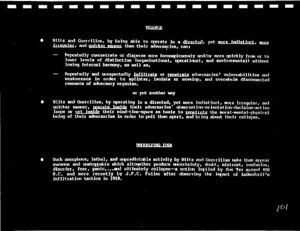Patterns of Conflict
| The works of |
| Works of John Boyd |
|---|
OODA WIKI Edition
Quantico Transcription
These are the kind of things that are going on. They’re more indistinct. They’re more irregular and quicker in ways we can’t seem to see through, because of the way they operate. They can concentrate or disperse, infiltrate or penetrate. So by operating this way, they’re going to get inside their adversaries’ OODA loops rather than the other way around.
You know, a lot of this, at least in the regular war, was uncovered by some of those people who fought in them. I’m trying to show you in those areas where they have the same ideas. Because guerrilla’s much more powerful, much more subtle social warfare than blitzkrieg.
How many people have read Clausewitz? Anybody here? Anybody read at least book one, chapter one of Clausewitz? Let me make a point with that. In fact, chapter one of book one’s considered the only chapter that was complete. The rest of them he hadn’t revised.
And on the very last page, he says you divide a government up into three components. Excuse me, society into three components. The government, the armed forces, and the people. He says you can do that. The government, the way he said it, was responsible for the policy; the armed forces, the security of the nation; and the people to provide the necessary support.
Let’s think about it. Just hold that. We’re going to appeal that paradigm. Let’s put that in our mind. Now let’s talk about a coup d’état. In a coup d’état, what are you doing? All you’re doing is you’re working against the regime or the government, not the armed forces or the people.
Now let’s talk about conventional warfare like blitzkrieg. We’re working against the armed forces and also the government, but the people are sort of the background.
Now let’s talk about guerrilla warfare. What are you doing? Now you’re trying to capture the people onto your side. And since that’s a support base for both the army or the military and the government, they’re just useless overhead now. They have nothing to run. Wither away.
Now whether Mao fought it that way or not, he was doing the right thing. Because without the people, you have nothing to run. You have no armed forces to— you have nothing to defend. It withers away.
Not only that, the armed force and the government are made up of the people, so the whole thing just dies away. It crumbles. And that’s why I say since it was a whole social fabric, it’s a greater totality of war than either blitzkrieg or other kind. Because you’ve got the whole social fabric of society involved.
Okay? Now let’s turn the argument around.
